Whether you are an avid indoor gardener of houseplants, or just passionate about cultivating a Venus Flytrap, the safety of small children and family pets will always be a consideration when introducing a new plant into your home. And rightly so!
Many of the most popular houseplants found in homes and offices today are indeed toxic if ingested and the cause of many skin irritations.
So, what about the Venus Flytrap? Do pet owners need to worry about the Venus Flytrap? Are Venus Fly Traps toxic to cats, dogs, or even humans?
Let’s take an in-depth look at this fascinating carnivorous plant.
Are Venus Fly Traps Poisonous to Cats?
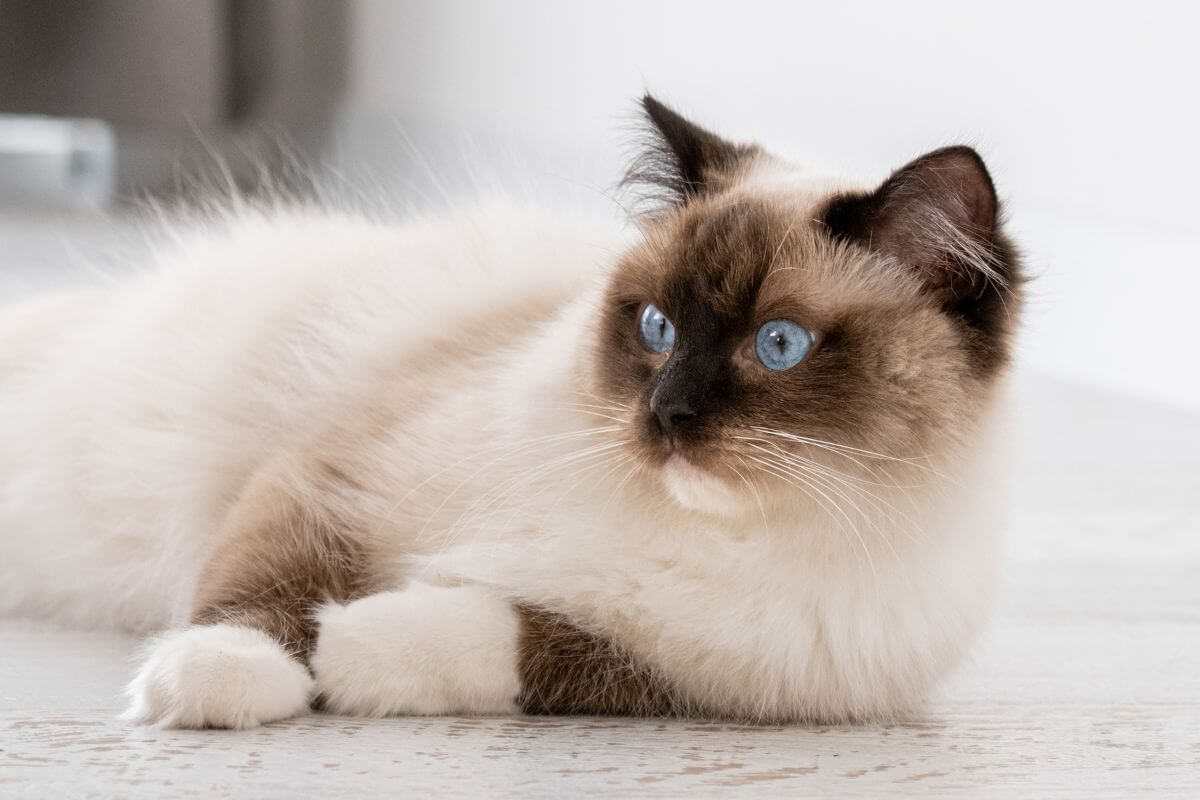
Venus Flytraps are not poisonous to cats! Should your cat accidentally trigger a trap on the plant, the trap will in no way harm your curious feline friend.
You may still want to place your plant out of your cat’s reach though. Cats are notoriously curious, and they are also excellent climbers. Your furry friend may decide to investigate your plant and damage it accidentally.
Many people still wonder – are Venus fly traps safe for cats because these carnivorous plants love to eat insects. But what about if the cat happens to eat it? Is the Venus fly trap toxic to cats if ingestion occurs?
What If My Cat Eats a Venus Flytrap Plant?
It would be rather unusual for a cat to chow down on this plant, because it has a sour taste. The nectar and fragrance produced by the Venus Flytrap do not generally pique a cat’s interest.
Should your feline nibble out of curiosity, there is no need to worry because the plant is not toxic when ingested. The fly trap is a safe plant to ingest.
What If My Cat Triggers the Flytrap?
The greatest risk when a cat meets a Venus Flytrap is for the nosy feline to trigger the trap by touching the trigger hairs. If this happens, your cat will be unharmed and will be able to easily remove its nose, paws, or whiskers from a closed or partially closed trap. As the plant does not have teeth or a forceful grip, your cat will be fine.
The real risk will be to your plant. Triggering the trap will consume a lot of the plant’s energy, and it is not ideal for a trap to open and close without food inside.
To prevent any risk to your plant, place it in a room or location that your cat does not have access to, or position it well out of reach in the room. You can also get some cat grass to keep your feline friend away from the houseplants.
- Related article: When Does a Venus Flytrap Open and Close?
Are Venus Fly Traps Poisonous to Dogs?
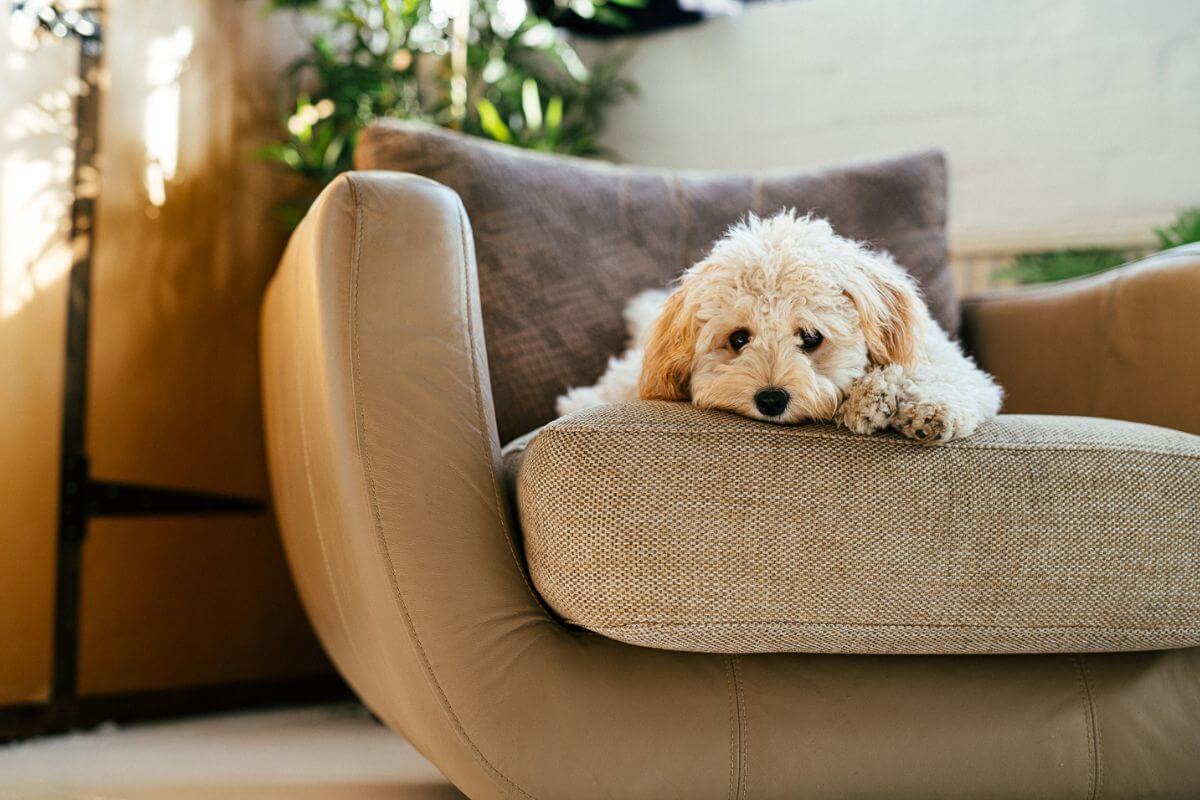
While the Venus Flytrap is certainly deadly to bugs, it is not a poisonous plant to our dogs. The American Society for the Prevention of cruelty to Animals (ASPCA) places the Venus Flytrap on its list of plants that are non-toxic to our canine friends.
On the other hand, your dog may decide to snack on your plant, damaging and possibly killing it. Should your dog decide to eat the plant, mild indigestion is the worst-case scenario.
Place your plant high enough so that your dog can’t reach it or put it in a location that your dog does not have access to. Another option is to train your dog to keep away from your indoor plants.
Are Venus Flytraps Poisonous to Humans?
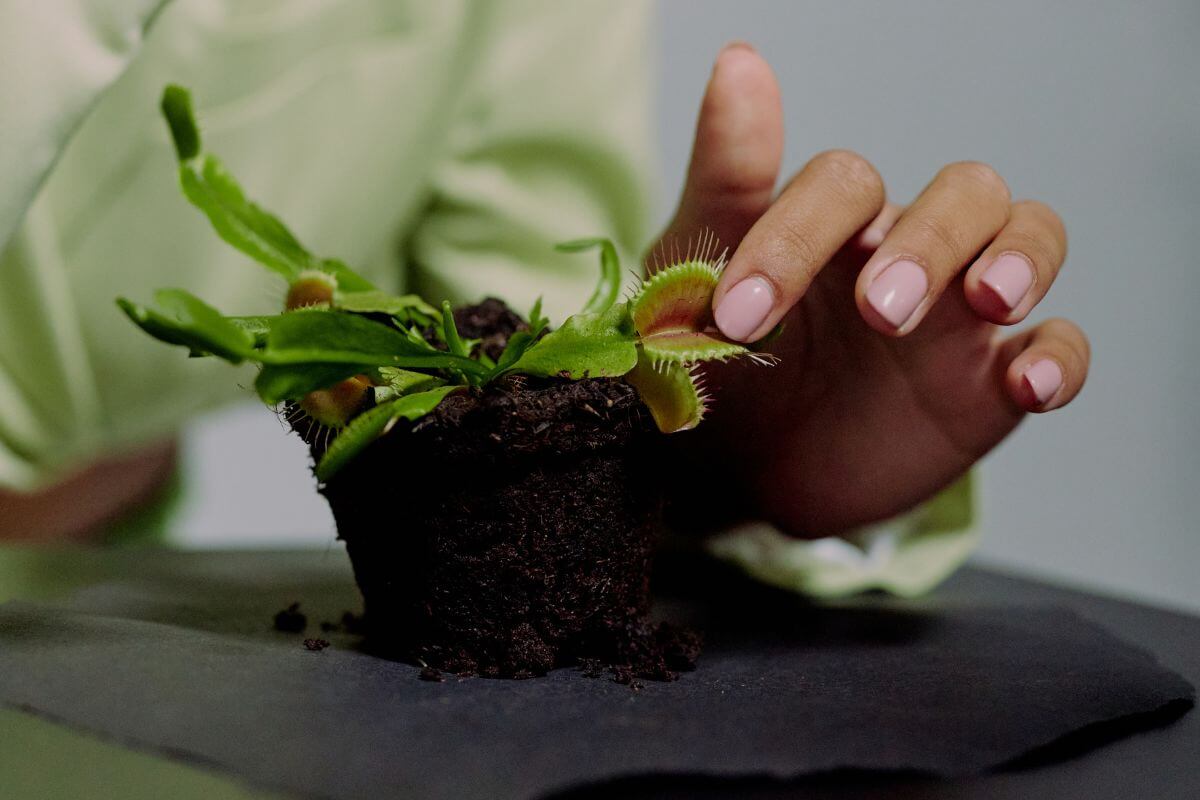
Venus Flytraps are not poisonous to humans. Even when touched, they are not dangerous as they contain no toxic substances or irritants in their foliage, stems, or traps.
The plant’s traps should still not be touched to avoid triggering them and wasting the plant’s energy. Touching and triggering traps can shorten the lifespan as each trap has a limited number of closings and openings before withering and dying, only to be replaced by new leaf growth.
Is a Venus Flytrap Safe for My Kids?
Yes, the Venus Flytrap is absolutely safe for children. Its appearance and trapping mechanism may spark a child’s curiosity but will in no way harm them.
That’s not to say that an inquisitive kid may not harm the plant. To protect the plant, place it out of the reach of children, or take the time to teach the kids about this extraordinary plant and how to protect it.
Can Venus Flytraps Bite?
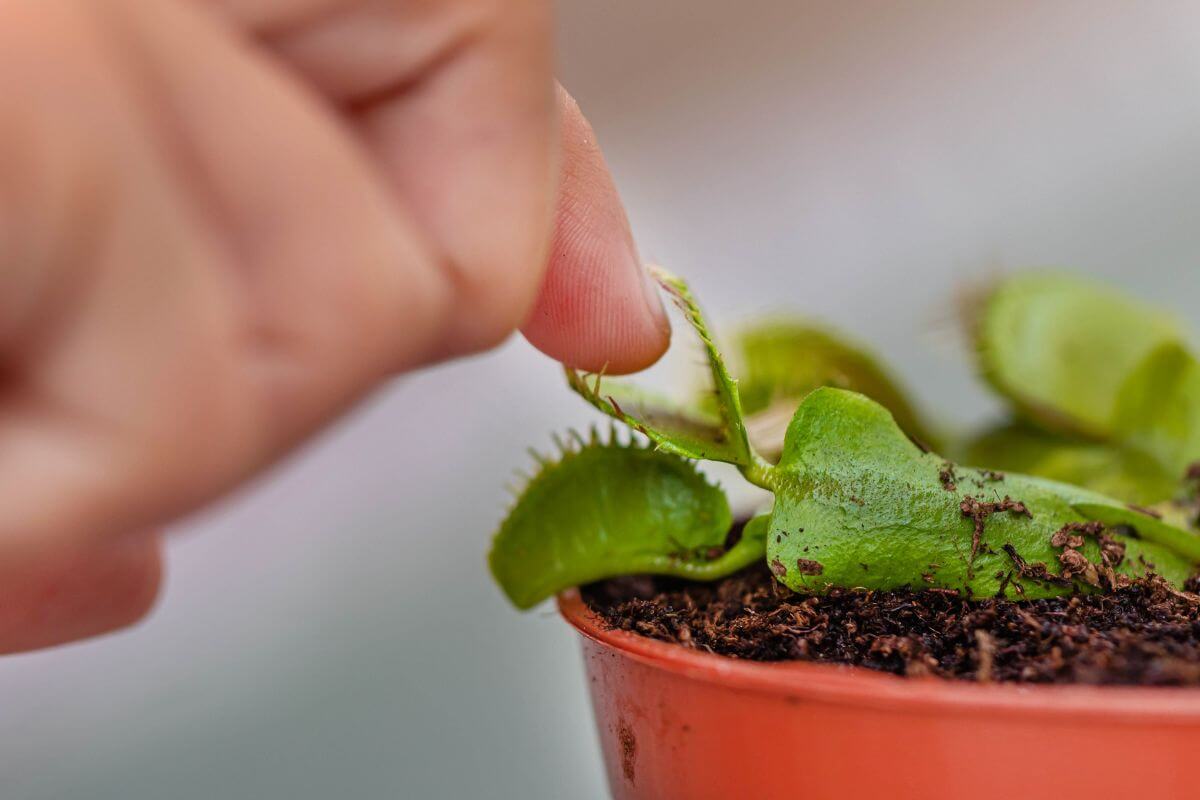
While a Venus Flytrap does have the capability to digest a small piece of human flesh, it does not actually bite. If you were to place your finger in the trap, the trap would try to close around it, but with no teeth, biting does not actually occur.
Only flies, spiders, and other small insects are at risk. Venus Flytraps won’t be able to trap and digest larger insects.
The Venus Flytrap secretes sweet nectar on the lobes of the trap, which in turn attracts insects through its fragrance. When an unsuspecting bug lands on the leaf lobe to enjoy the nectar, it will unwittingly trigger the hairs on the leaves, which in turn tells the plant that dinner has arrived.
In less than a second, the trap will snap shut, imprisoning the prey. If the insects are very tiny, they may be able to escape as the trap does not seal immediately.
But when a larger fly or spider begins to struggle in an attempt to flee, the trap will gradually tighten, and the plant will begin to produce digestive enzymes that will kill the prey and liquefy it for absorption.
Are Venus Flytraps Safe for the Home?
Yes, the Venus Flytrap is perfectly safe for humans and pets when cultivated indoors at home. You have to worry about it being a dangerous plant for you and your loved ones.
Tips to Keep Venus Flytraps Away from Pets
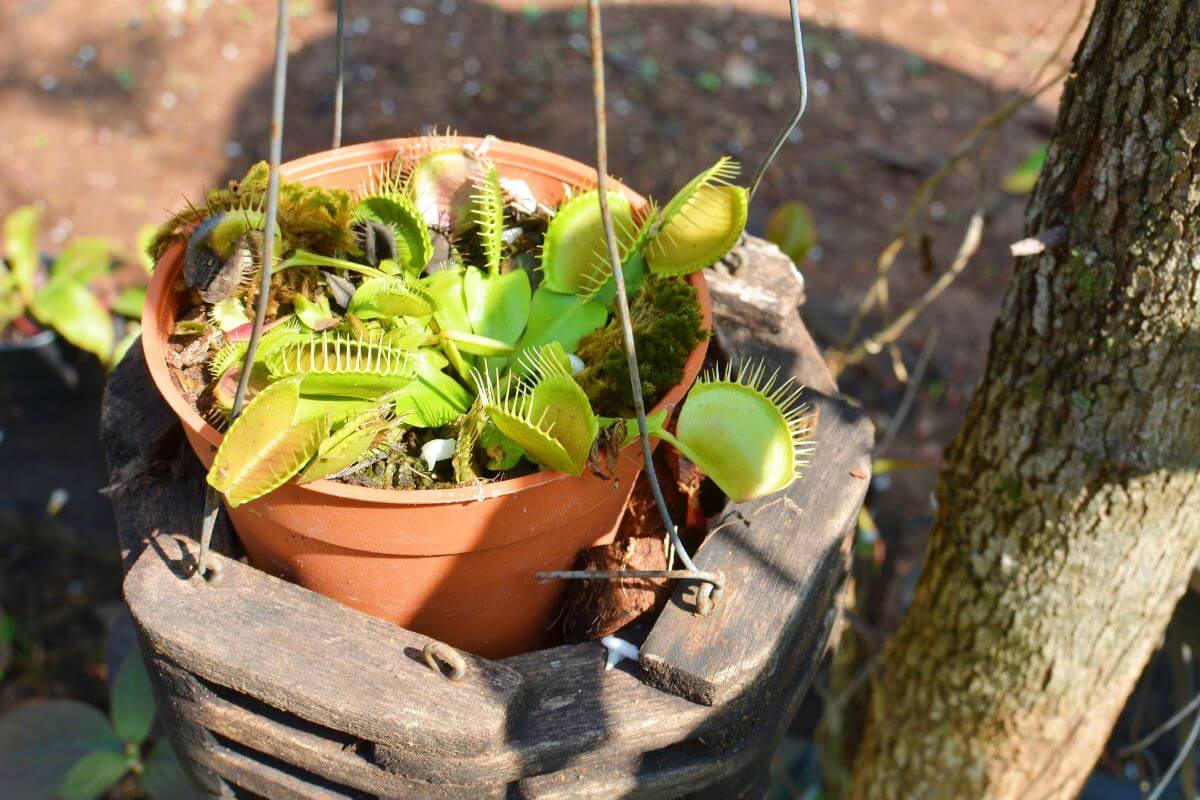
Venus Flytraps present no type of risk to family pets. On the contrary, it’s actually the pets who are a danger to the well-being of the plant. To ensure your plant’s survival, it will need to be protected from curious paws and noses.
The best way to protect your Venus Flytrap is to keep it out of the reach of pets. This may be easier with dogs, because felines are known for their agility and climbing abilities.
Because these plants enjoy the sunshine and thrive in it, a windowsill is an ideal spot, but the sill should be high enough to keep your plant out of harm’s way.
A sure-fire way to protect your plant is to place it in a room where pets are not allowed to go. If you do not have this option and are worried about an industrious feline, consider a hanging basket or a terrarium where a pet has a very tough time reaching the plant.
Venus Flytraps and Toxicity Final Thoughts
In a home with either small children or pets, your Venus Flytrap plant is the one in danger and not the other way around. Should the unthinkable happen, know that your kids and pets will be safe while your plant may see the worst of a close encounter.
To learn more about this captivating plant, check out these articles:

